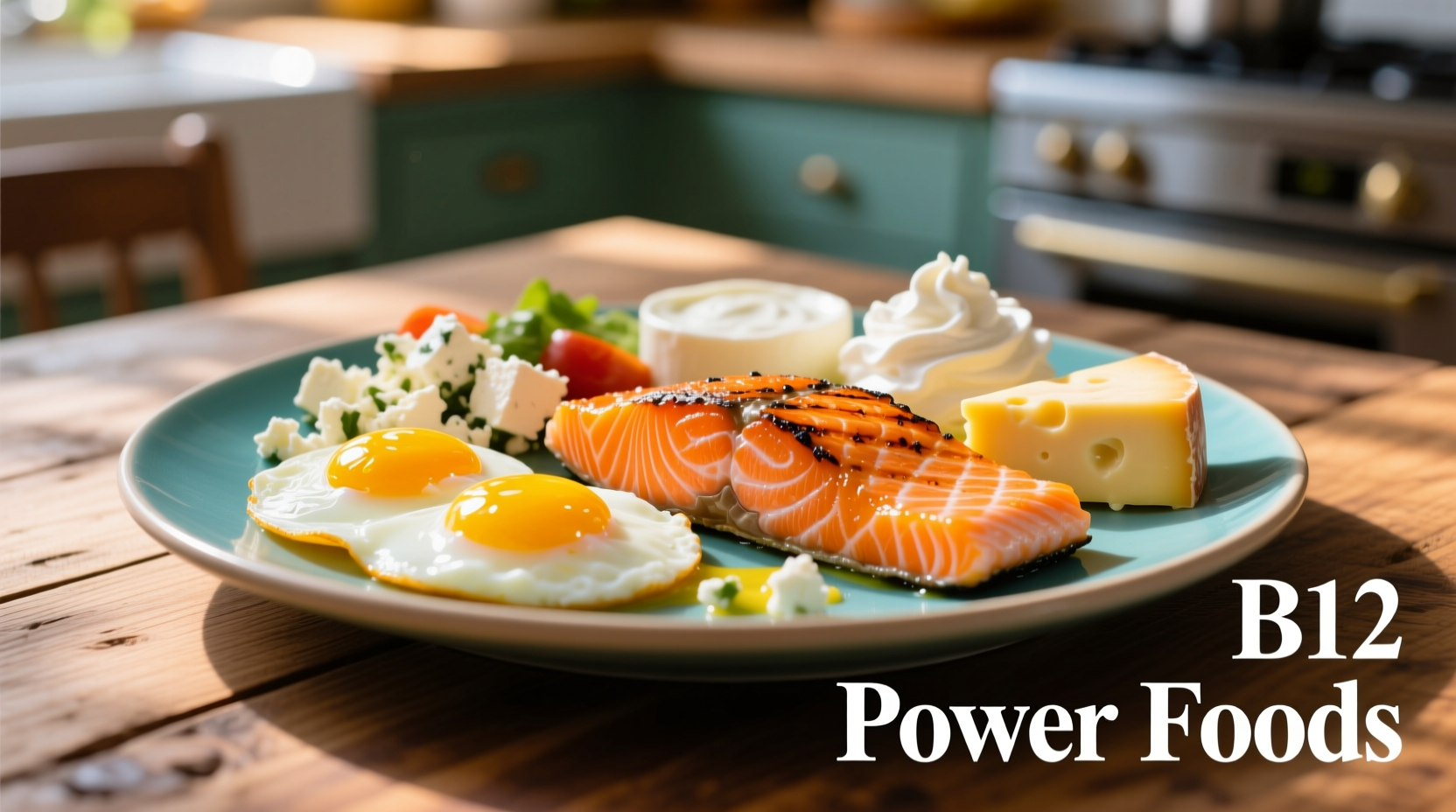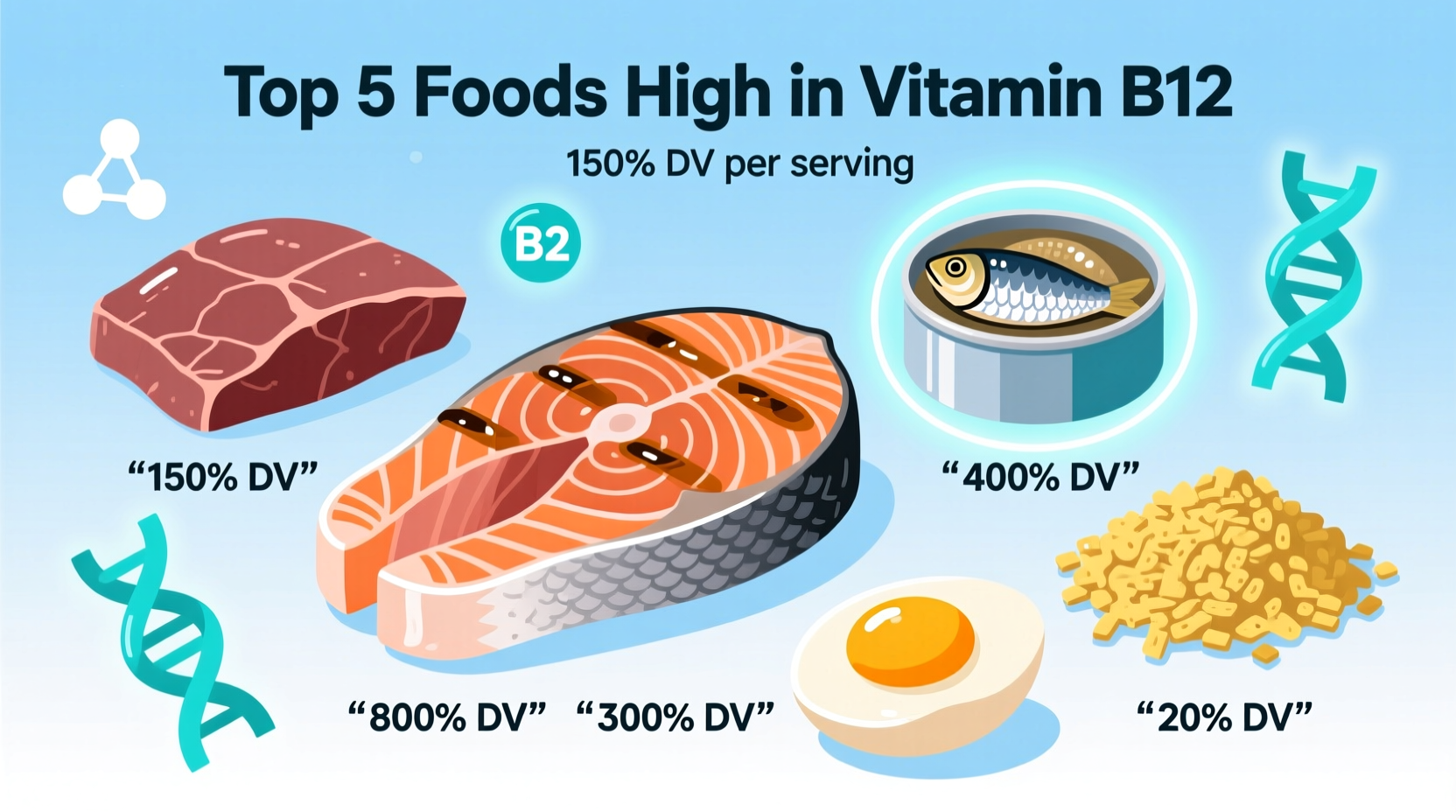Why Vitamin B12 Matters for Your Health
Vitamin B12, also known as cobalamin, plays a critical role in your body's functioning. This essential nutrient supports nerve function, red blood cell formation, and DNA synthesis. Unlike other vitamins, your body doesn't produce B12 naturally—you must get it through food or supplements.
According to the National Institutes of Health, adults need 2.4 micrograms of B12 daily. However, certain groups—including older adults, vegetarians, vegans, and people with digestive conditions—often struggle to meet these requirements through diet alone.

Natural B12 Powerhouses: Animal-Based Sources
Animal products contain the most bioavailable form of vitamin B12. Here's what you need to know about incorporating these foods into your regular meals:
Seafood: The Ultimate B12 Source
Clams stand as the undisputed champion of B12 content. Just 3 ounces of cooked clams delivers a staggering 84.1 mcg—more than 3,500% of your daily needs. Other excellent seafood options include:
- Mussels: 20.4 mcg per 3-ounce serving
- Trout: 3.5 mcg per 3-ounce serving
- Salmon: 4.9 mcg per 3-ounce serving
- Tuna: 2.5 mcg per 3-ounce serving
Research from the USDA FoodData Central shows that fatty fish like salmon provide not only B12 but also omega-3 fatty acids, creating a powerful nutritional combination.
Organ Meats: Nature's Multivitamin
Beef liver offers an impressive 70.7 mcg of B12 per 3-ounce serving. While organ meats aren't everyone's favorite, they represent one of nature's most concentrated nutrient sources. If you're new to organ meats, try these preparation tips:
- Soak liver in milk for 30-60 minutes before cooking to reduce strong flavor
- Cook with onions and herbs to enhance palatability
- Start with small portions (2-3 ounces) to adjust to the taste
| Food Source | Portion Size | B12 Content (mcg) | % Daily Value |
|---|---|---|---|
| Clams | 3 ounces | 84.1 | 3,504% |
| Beef Liver | 3 ounces | 70.7 | 2,946% |
| Mussels | 3 ounces | 20.4 | 850% |
| Salmon | 3 ounces | 4.9 | 204% |
| Trout | 3 ounces | 3.5 | 146% |
B12 Options for Vegetarians and Vegans
Finding sufficient B12 without animal products requires careful planning. Unlike animal foods, plant-based options naturally contain little to no B12. Your best options include:
Fortified Foods: Essential for Plant-Based Diets
Nutritional yeast stands out as a versatile, flavorful option. Just one tablespoon of fortified nutritional yeast provides up to 15 mcg of B12. Other fortified options include:
- Plant-based milks (soy, almond, oat)
- Breakfast cereals
- Meat substitutes
- Nutritional yeast
The Mayo Clinic emphasizes that vegetarians and vegans should regularly consume fortified foods or supplements to prevent deficiency, as plant foods don't naturally contain reliable B12 sources.
Maximizing B12 Absorption Through Smart Eating
Simply eating B12-rich foods isn't enough—you need to optimize absorption. Consider these practical strategies:
Pair with Acidic Foods
Your stomach acid helps release B12 from food proteins. Pair B12-rich foods with lemon juice, vinegar, or tomatoes to enhance absorption, especially important for older adults whose stomach acid production decreases with age.
Space Out Your Intake
Unlike water-soluble vitamins that flush out quickly, B12 stores in your liver. However, spreading your intake throughout the week supports consistent levels. Try incorporating different B12 sources across meals:
- Breakfast: Fortified cereal with plant-based milk
- Lunch: Salmon salad sandwich
- Dinner: Beef liver with roasted vegetables
Special Considerations for Different Dietary Needs
Your B12 requirements and absorption capabilities change based on various factors:
Aging and B12 Absorption
As you age, your stomach produces less acid, making it harder to absorb B12 from food. The Harvard T.H. Chan School of Public Health notes that adults over 50 may need to rely more on fortified foods or supplements, as these contain B12 in a form that doesn't require stomach acid for absorption.
Vegetarian and Vegan Considerations
Plant-based diets require careful planning to meet B12 needs. While some plant foods like tempeh and algae contain B12 analogs, these aren't reliably absorbed by your body. Regular consumption of fortified foods or supplements remains essential.
Medical Conditions Affecting Absorption
Certain conditions—including pernicious anemia, Crohn's disease, and celiac disease—can impair B12 absorption. If you have digestive issues, consult your healthcare provider about appropriate B12 testing and potential supplementation needs.
Practical Tips for Incorporating B12-Rich Foods Daily
Here's how to seamlessly integrate B12-rich foods into your regular eating pattern:
- Add nutritional yeast to popcorn or roasted vegetables for a cheesy flavor
- Include canned salmon in sandwiches or salads for quick meals
- Try liver pâté as a spread on whole-grain crackers
- Use fortified plant milks in smoothies and cereals
- Make a weekly seafood dinner tradition with salmon or trout
When Food Isn't Enough: Understanding Supplementation
While food should be your primary B12 source, supplements become necessary in certain situations:
- Confirmed B12 deficiency
- Medical conditions affecting absorption
- Strict vegan diets without regular fortified food consumption
- Age-related absorption issues
Sublingual (under-the-tongue) B12 supplements offer an alternative absorption route that bypasses potential digestive issues. Always consult with a healthcare provider before starting any new supplement regimen.
Frequently Asked Questions About B12-Rich Foods
Can you get enough B12 from plant-based foods alone?
No, you cannot reliably get enough B12 from natural plant-based foods alone. While some plant foods like tempeh and algae contain B12 analogs, these aren't effectively absorbed by your body. Vegetarians and vegans must consume fortified foods (like nutritional yeast, plant milks, and cereals) or supplements to meet their B12 needs.
How much B12 do I need daily from food sources?
Adults need 2.4 micrograms of vitamin B12 daily. Pregnant women require 2.6 mcg, and breastfeeding women need 2.8 mcg. Older adults may need higher amounts due to decreased absorption. Consuming a variety of B12-rich foods throughout the week helps maintain optimal levels.
Which fish has the highest B12 content?
Clams contain the highest B12 content of any seafood at 84.1 mcg per 3-ounce serving. Among commonly consumed fish, mussels provide 20.4 mcg per 3-ounce serving, while salmon offers 4.9 mcg and trout provides 3.5 mcg per 3-ounce serving.
Does cooking destroy vitamin B12 in foods?
Cooking doesn't significantly destroy vitamin B12. Unlike some heat-sensitive vitamins, B12 remains stable during normal cooking processes. However, prolonged high-heat cooking may reduce B12 content slightly. Steaming, baking, or quick sautéing preserves maximum nutrient content.
How can I tell if I'm getting enough B12 from my diet?
Signs of adequate B12 include sustained energy levels, healthy nerve function, and normal red blood cell counts. The most reliable way to determine your B12 status is through blood testing. If you follow a vegetarian or vegan diet, are over 50, or have digestive issues, regular B12 testing is recommended to ensure you're meeting your needs.











 浙公网安备
33010002000092号
浙公网安备
33010002000092号 浙B2-20120091-4
浙B2-20120091-4